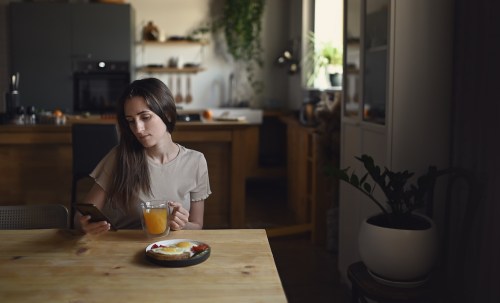Our editors independently select these products. Making a purchase through our links may earn Well+Good a commission
Many folks value having a certain amount of alone time in their life, during which they’re free from any real or perceived pressures to socialize, impress others, or navigate crowded places. This is especially true for introverts, many of whom understand alone time not just as a window to be away from others but also as an opportunity to be in tune with themselves and replenish their energy. But can you have too much of a good thing? That is, what’s the separation between healthy amounts of alone time versus more concerning bouts of social isolation?
Experts in This Article
Anna Akbari, Ph.D. is a Sociologist and Author of Startup Your Life: Hustle and Hack Your Way To Happiness.
Ilene Cohen, Ph.D. a psychotherapist and author of It’s Within You: A Detailed Road Map to Igniting, Deeper Self-Worth, Richer Relationships, and Greater Personal Freedom.
licensed clinical psychologist and co-founder of Therapy Group of NYC
“Alone time is generally thought of as more intentional, something that you choose, whereas social isolation is a situation you find yourself in, perhaps unwillingly, or not unknowingvof how to change it. Or, it’s a pattern of an unhealthy behavior,” says Anna Akbari, PhD, a sociologist and author of Startup Your Life: Hustle and Hack Your Way To Happiness.
Beyond not being one and the same, alone time and social isolation stand to affect your mental health differently—regardless of whether you’re an introvert or an extrovert. Given this reality, being able to decipher between the two is key for ensuring you’re setting yourself up for mental-health success.
How alone time can affect mental health
For introverts, especially, taking time to mentally (and physically!) recharge after social interactions offers the opportunity to learn about oneself. Spending time with yourself without the need to impress or constantly socialize with others can promote a sense of peacefulness.
Research has also found that spending time alone may help us build better relationships with others upon subsequent socializing—and that does make sense. When you’ve prioritized yourself and spent time focusing on your needs, you’re likely to be better equipped to enter any social opportunity with a better mood, a heightened sense of self, and even a renewed desire to be with other people.
That said, the way in which you spend your alone time is just as important as having the time period. And the main piece of guidance for being successful in having an effectively rejuvenating alone-time session is to be intentional.
“Being physically alone does not mean that you are engaging in recharge mindfulness,” says Dr. Akbari, who adds that without the action of checking in with your own thoughts, a passive alone-time session marked by distraction may not be any more rejuvenating than, say, being in a crowded room.
How social isolation can affect mental health
While proper amounts alone time offers benefits, including leading to better relationships and moods, what happens when you have too much of it—i.e., social isolation? “Social isolation is really when you totally take yourself out of social interactions,” says Ilene Cohen, PhD, a psychotherapist and co-author of It’s Within You, adding that many kinds of social isolation exist. These can include choosing to be physically away from social opportunities, being disconnected from the outside world, or even being in your own shell when surrounded by people.
“Social isolation is really when you totally take yourself out of social interactions.” —Ilene Cohen, PhD, psychotherapist
And the effects aren’t great as far as mental health is concerned: According to a review of 16 studies published in The World Journal of Psychiatry, subjective social isolation in older adults may lead to worsened sleep disturbances, depression, and fatigue. But experts say such unsavory effects could also extend to any number of people.
Jaclyn Lopez Witmer, PsyD, a clinical psychologist and cofounder of Therapy Group of NYC says many of her clients who were forced to be physically isolated during the pandemic found themselves feeling socially isolated and lonely. “We’re kind of talking about feeling this emptiness and this loss of connection,” she says. How can all of us work to mindfully avoid social isolation (but still enjoy the benefits of alone time)? Experts have tips for finding balance below
4 tips for enjoying alone time without veering into social isolation
1. Reach out to others for any amount of quality time
When you’ve enjoyed your personal time, it’s important to be sure to get yourself back out there again. And, for all you introverts, this doesn’t mean hosting a party for every night you spend in. Rather, interactions as small as a a 10-minute chat with a friend or making plans to have lunch with one person can help you build connectivity and protect you against the negative effects of social isolation. Work toward “whatever small increments you can sustain,” says Dr. Akbari.
2. Slowly implement small social interactions in your day-to-day
Whether it’s saying hi to the cashier at the grocery store or taking the time to go out and interact with a barista as you order your cup of joe, always acknowledge the small interactions that you make in your life. These “weak ties” relationships are important for fostering connection, too.
3. Find your community
Dr. Witmer recommends seeking out activities that we’re interested in, whether that’s playing a sport or joining a club. That’s because, she says, when you’re surrounded by things you find enjoyable, “you’re kind of building your own confidence in being in spaces that you wouldn’t normally be in.” Taking the time to go to a yoga class or an event that you find interesting helps ease that feeling of being among other people. If anything, you get to enjoy what you like among people who like the same thing.
4. Practice mindfulness
This can be as simple as recognizing the sounds and environment around you, appreciating the moment you’re in right now. When you spend your alone time being mindful, you’re allowing yourself to recharge and let your mental health rest from all the pressure of socializing.
Oh hi! You look like someone who loves free workouts, discounts for cutting-edge wellness brands, and exclusive Well+Good content. Sign up for Well+, our online community of wellness insiders, and unlock your rewards instantly.
Sign Up for Our Daily Newsletter
Get all the latest in wellness, trends, food, fitness, beauty, and more delivered right to your inbox.
Got it, you've been added to our email list.











